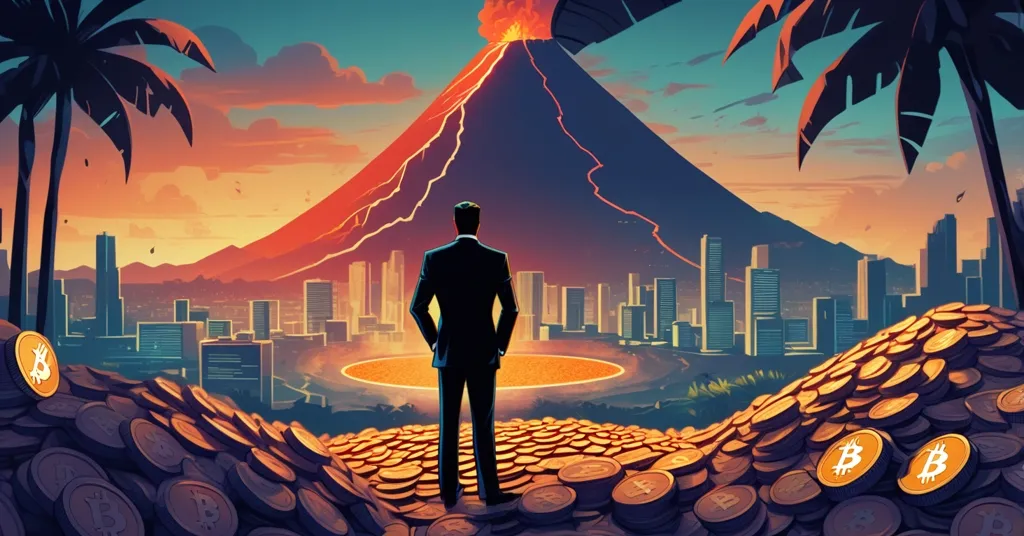IMF Accuses El Salvador of Faking Bitcoin Purchases in $1.4B Loan Dispute

IMF Slams El Salvador: Bitcoin Purchase Claims Called Out as False
El Salvador’s pioneering journey with Bitcoin as legal tender has taken a sharp turn into controversy, with the International Monetary Fund (IMF) accusing the nation of fabricating claims about regular Bitcoin acquisitions. Tied to a $1.4 billion loan agreement, the IMF’s latest report bluntly states that no new Bitcoin has been purchased since December 2024, challenging the government’s narrative of daily accumulation and exposing a web of questionable accounting under President Nayib Bukele’s high-profile crypto crusade.
- IMF’s Accusation: No new Bitcoin bought since December 2024, despite claims of daily purchases.
- Wallet Shuffling: Reported growth in holdings is just internal transfers, not fresh buys.
- Failed Promises: Bitcoin City, Volcano Bonds, and other projects remain stalled or dead.
IMF Drops a Bombshell on Bitcoin Purchases
Back in 2021, El Salvador made history by becoming the first country to adopt Bitcoin as legal tender, a move spearheaded by President Nayib Bukele as a radical push for financial inclusion and a direct challenge to traditional monetary systems. The decision was met with both awe and skepticism—global headlines praised the audacity, while bodies like the IMF warned of economic chaos due to Bitcoin’s notorious volatility. Fast forward to 2025, and the tension between decentralized ambition and centralized oversight has come to a head. As part of a 40-month, $1.4 billion Extended Fund Facility (EFF) loan agreement signed in late 2024 to stabilize El Salvador’s economy, the IMF’s first review delivers a damning assessment: the country hasn’t acquired a single new Bitcoin since December of last year, as detailed in a recent IMF critique of El Salvador’s BTC purchase claims.
El Salvador’s Bitcoin Office, tasked with managing and reporting on the nation’s crypto activities, has been touting a steady accumulation, claiming holdings of 6,242.18 BTC with a 30 BTC increase in the past 30 days. But the IMF calls this out as pure fiction. In a pointed footnote, their report cuts through the hype with cold precision:
“Increases in Bitcoin holdings in the Strategic Bitcoin Reserve Fund reflect the consolidation of Bitcoin across various government-owned wallets.”
Translation? The government isn’t stacking new sats—it’s just moving existing Bitcoin between its own accounts, like the Strategic Bitcoin Reserve Fund and the state-backed Chivo e-wallet, and passing it off as growth. Think of it as rearranging cash between your savings and checking accounts, then bragging about a windfall. Nice try, but we’re not buying it. Worse still, the EFF agreement explicitly prohibits new Bitcoin purchases, a condition meant to curb fiscal risk and force El Salvador to prioritize stability over crypto gambling. On paper, Bukele’s hands are tied, no matter how much he rails against the suits, a point further explored in an IMF report analysis on El Salvador’s Bitcoin dealings.
A Graveyard of Broken Crypto Dreams
Beyond the accounting sleight of hand, El Salvador’s Bitcoin experiment is littered with unfulfilled visions. When Bukele announced Bitcoin City in 2021, it was pitched as a tax-free, zero-CO₂ utopia in La Unión, powered by geothermal energy from volcanoes and funded by crypto profits. Four years later, it’s still a mirage—no construction, no residents, just empty hype. Then there’s the Volcano Bonds, a $1 billion Bitcoin-backed bond scheme meant to split funds between buying more BTC and building infrastructure. Slated for launch in early 2022, it was derailed by a brutal crypto market crash and geopolitical turmoil from the Russia-Ukraine conflict, leading to an indefinite postponement. As Finance Minister Alejandro Zelaya admitted at the time:
“We believe that between March 15 and 20 is the right timing, we have the tools almost finished. But the international context will tell us … I didn’t expect the war in Ukraine.”
Three years on, those bonds are still vaporware. The LaGeo geothermal mining facility, another 2021 brainchild to mine Bitcoin sustainably using volcanic energy, sits idle as of 2025. Even smaller initiatives—like Chivo Pets, a Bitcoin-funded veterinary hospital that shuttered in March, an NFT casino that never launched, and the Chivo Wallet’s declining usage due to bugs and distrust—paint a picture of overpromise and underdelivery. For everyday Salvadorans hoping for tangible benefits, whether through cheaper remittances or economic boosts, these flops sting more than any IMF report. It’s not just policy failing; it’s people’s expectations left in the dust, as discussed in a detailed overview of El Salvador’s Bitcoin holdings and wallet strategies.
Bukele’s Defiance Meets Pragmatic Pivots
Nayib Bukele isn’t one to take criticism lying down. On March 4, 2025, he fired back on X with the kind of brash energy that’s made him a darling of Bitcoin maximalists worldwide:
“No, it’s not stopping. If it didn’t stop when the world ostracized us and most ‘bitcoiners’ abandoned us, it won’t stop now, and it won’t stop in the future. Proof of work > proof of whining.”
That’s vintage Bukele—unapologetic, defiant, and leaning into Bitcoin’s proof-of-work ethos as a metaphor for grinding through adversity while critics just complain. For the uninitiated, proof of work is Bitcoin’s energy-intensive mechanism for validating transactions, ensuring security through raw computational effort. Bukele’s jab implies El Salvador’s commitment is real labor, not empty talk. And he’s got a point: the nation didn’t fold when global powers mocked their Bitcoin law in 2021, surviving ostracism and even a wave of early “bitcoiners” jumping ship during market lows. Why would IMF pressure stop them now? This saga is well-documented in a historical summary of Bitcoin as legal tender in El Salvador.
Yet, beneath the bravado, there’s evidence of compromise. In January 2025, El Salvador tweaked legislation to make Bitcoin acceptance voluntary for businesses—a direct nod to IMF demands despite the public chest-thumping. This isn’t defiance; it’s pragmatism. With billions in loans on the line, Bukele seems to know when to play ball, even if he won’t admit it. This duality—fiery rhetoric paired with quiet compliance—suggests the Bitcoin push might be as much about political optics as ideological purity. Is he a true believer in decentralization, or a populist chasing global headlines? Perhaps both, but the jury’s still out, as highlighted in discussions around Bukele’s stalled Bitcoin projects and policy updates.
Ground-Level Impact: Are Salvadorans Better Off?
Let’s zoom in on the human cost. The Chivo Wallet, launched as the state-backed tool for Bitcoin transactions, was supposed to empower the unbanked and slash remittance fees—a lifeline for a nation where many rely on money sent from abroad. Early reports showed promise, with signup bonuses luring users. But persistent technical glitches, security fears, and a steep learning curve have tanked adoption rates over time. Small merchants, initially forced to accept Bitcoin, often struggled with volatile value swings—imagine selling coffee for 0.0001 BTC today, only to see it worth half as much tomorrow. While exact usage stats are murky, anecdotal evidence suggests many Salvadorans have reverted to cash or dollars, disillusioned by the experiment’s chaos, a sentiment echoed in community discussions on the impact of Bukele’s Bitcoin strategy on locals.
The broader economic picture isn’t rosy either. Bitcoin’s price rollercoaster since 2021 means national holdings, bought at various points, likely sit at a loss during bear markets, straining public finances if liquidated. If BTC drops 20% overnight—a plausible scenario given past crashes—savings tied to it could evaporate, hitting an already fragile economy hard. The IMF isn’t wrong to flag this as a fiscal landmine, even if their heavy-handed oversight grates on those of us who champion decentralized money. For now, the promised financial revolution feels more like a burden than a breakthrough for the average citizen.
Transparency: Where’s the Blockchain Proof?
Here’s where things get downright infuriating. Bitcoin’s beauty lies in its transparency—every transaction is recorded on a public ledger, verifiable by anyone with an internet connection. If El Salvador claims daily buys or even just wallet consolidations, they could easily publish the wallet addresses for the Strategic Bitcoin Reserve Fund or Chivo system. Show us the on-chain data, and this he-said-she-said mess with the IMF evaporates. So why the secrecy? Is it political optics, hiding losses or mismanagement? Technical incompetence? Or something shadier? Without those receipts, trust erodes—and for a system built on decentralization, that’s a cardinal sin, a concern raised in online forums like this Reddit thread on IMF-El Salvador Bitcoin controversy.
For newcomers, on-chain data refers to the public record of Bitcoin transactions stored on the blockchain. Think of it as a global, tamper-proof ledger where every move of BTC is tracked. Governments or entities holding Bitcoin can share their wallet addresses (unique identifiers like a bank account number) to prove their holdings or trades. El Salvador’s refusal to do so is a red flag, especially when transparency could silence critics overnight. We’re left wondering if Bukele’s team is dodging scrutiny or just clueless about leveraging Bitcoin’s core strength.
Why El Salvador’s Gamble Matters Globally
This isn’t just a local spat—it’s a litmus test for national crypto adoption. El Salvador’s rocky path could shape how other countries approach Bitcoin or broader decentralized finance. Places like the Central African Republic, which also adopted Bitcoin as legal tender, are watching closely. If IMF pressure and internal missteps chill enthusiasm, the dream of sovereign, decentralized money takes a hit. But even failures teach lessons. Bukele’s push, flawed as it is, embodies effective accelerationism—a relentless drive to disrupt broken financial systems, damn the setbacks. Messy experiments today could inspire refined models tomorrow, though challenges persist as noted in an analysis of transparency issues in Bukele’s Bitcoin initiatives.
Playing devil’s advocate, the IMF’s caution isn’t baseless. Their loans, while often criticized for curbing sovereignty, are a lifeline for struggling nations. Oversight might prevent reckless spending, even if it stifles innovation. A total Bitcoin collapse could tank El Salvador’s economy, validating their meddling. Yet, as Bitcoin maximalists, we can’t help but root for the middle finger to centralized control. Bitcoin isn’t just currency; it’s a rebellion against overreach. Still, execution matters, and right now, Bukele’s vision is drowning in unkept promises.
Could other blockchain tech fill the gaps? Absolutely. Stablecoins—cryptocurrencies pegged to assets like the US dollar—offer less volatility for daily transactions, something Bitcoin’s wild swings can’t match. Ethereum’s smart contracts could enable automated, transparent financial tools for remittances or savings, complementing Bitcoin’s role as a store of value and hedge against fiat decay. El Salvador doesn’t need to be BTC-only; a hybrid approach might better serve its people while still disrupting the status quo.
Key Questions and Takeaways on El Salvador’s Bitcoin Saga
- What’s the core of the IMF’s criticism of El Salvador’s Bitcoin strategy?
They assert no new Bitcoin has been purchased since December 2024, claiming reported growth is merely internal wallet shuffling, not real accumulation, which raises major transparency issues. - How are Bukele’s Bitcoin initiatives affecting everyday Salvadorans?
Stalled projects like Bitcoin City and declining Chivo Wallet usage due to technical woes mean promised benefits—cheaper remittances, financial access—remain out of reach for most citizens. - Is Nayib Bukele truly defying IMF pressure on Bitcoin policy?
His fiery X posts say no surrender, but policy shifts like making Bitcoin optional for businesses show he’s pragmatically aligning with IMF loan conditions behind the scenes. - Why is blockchain transparency non-negotiable in this debate?
Bitcoin’s public ledger allows anyone to verify transactions, so unpublished government wallet addresses fuel skepticism about holdings—proof on-chain is critical to trust. - Could other cryptocurrencies bolster El Salvador’s financial experiment?
Stablecoins or Ethereum tools could provide stability for daily use, filling niches Bitcoin’s volatility can’t address, while still advancing decentralized finance goals. - What’s the global stakes of El Salvador’s Bitcoin journey?
As a pioneering case, its struggles and IMF pushback might deter other nations from adopting crypto as legal tender, potentially slowing the broader decentralized money revolution.
El Salvador’s Bitcoin odyssey is a high-wire act—equal parts inspiring and exasperating. We stand firm for accelerationist disruption: tear down the old financial guard, let decentralized tech redefine money, and push boundaries no matter the bruises. But dreams don’t pay bills, and right now, Bukele’s grand plans are mired in questionable reporting and a trail of flops. The IMF may be a stodgy referee we love to hate, but their critique forces a gut check on whether this gamble serves Salvadorans or just political theater. What’s next? Covert buys defying the loan terms? A pivot to other blockchains if Bitcoin’s volatility bites harder? Keep your eyes on the blockchain, not just the headlines, because in this battle for financial freedom, only proof of work—not promises—will win the day.



